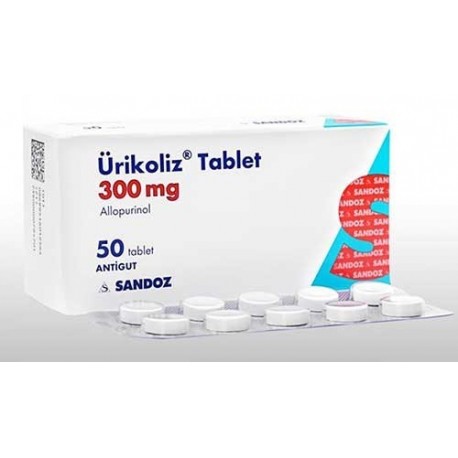 View larger
View larger Allopurinol (Zyloprim) 300 Mg 50 Tablets
ALL3874
New product
BUY MORE PAY LESS
| Quantity | Discount | |
|---|---|---|
| 2 | 5% | |
| 3 | 10% | |
| 4 | 15% | |
| 5 | 20% |
Volume discounts
| Quantity | Discount | You Save |
|---|---|---|
| 2 | 5% | Up to $2.80 |
| 3 | 10% | Up to $8.40 |
| 4 | 15% | Up to $16.80 |
| 5 | 20% | Up to $28.00 |
More info
Zyloprim 300 mg tablet
It is taken orally.
Active ingredient
Each tablet contains 300 mg of allopurinol.
Excipients
Microcrystalline cellulose, cellulose powder, povidone K-25, polyethylene glycol 4000, crospovidone, talc, magnesium stearate
What is zyloprim and what is it used for?
zyloprim contains allopurinol, an active substance from the group of antigut drugs.
zyloprim is available in 50 or 100 tablets containing 300 mg of allopurinol.
zyloprim may be prescribed for any of the following conditions:
• Used in the treatment of gout. In gout, the body produces too much of a substance called uric acid. Uric acid accumulates as crystals in joints and tendons, causing inflammation. This inflammation causes swelling in the tissue around the joint and painful sensitivity even with a light touch. When the joints are moved, it causes severe pain.
• It is used to prevent other conditions in which uric acid accumulation is seen in the body. These conditions can be in kidney stones and kidney problems or can be seen during cancer treatment.
How to use zyloprim?
Instructions for appropriate use and dose / frequency of administration
Use zyloprim as your doctor has advised you. If you are not sure about anything, consult your doctor or pharmacist.
The usual dose is between 100 and 900 mg per day. Treatment is usually initiated at a daily dose of 100 to 300 mg.
Application route and method
• It is taken orally with a sufficient amount of liquid.
• It is taken with or just after meals.
Different age groups
Use in children
In secondary hyperuricemia in children; For 6-10 years old, 300 mg per day is given.
Use in the elderly
Considering the decreasing kidney functions with old age, the dose should be reduced by your doctor.
Special use cases
Kidney / Liver failure:
It should be used with caution in patients with liver disease and the dose should be reduced if necessary.
The dose should be reduced by your doctor in kidney failure.
If you have an impression that the effect of zyloprim is too strong or too weak, talk to your doctor or pharmacist.
If you use more zyloprim than you should
Overdose or acute poisoning with allopurinol has not been reported.
There is no specific antidote in the treatment of poisoning.
There is no clinical experience with overdose.
Allopurinol and its metabolite oxipurinol can be dialysed away. However, the benefit of dialysis in poisoning treatment is unknown.
If you have used more than you should use from zyloprim, talk to a doctor or pharmacist.
if you forgot to use zyloprim
Do not take a double dose to make up for forgotten doses.
Effects that may occur when treatment with zyloprim is terminated
Do not stop using the drug without talking to your doctor.
What are the possible side effects?
Like all medicines, there may be side effects in people who are sensitive to the substances contained in the content of zyloprim.
If any of the following occur stop using zyloprim and IMMEDIATELY inform your doctor or go to the nearest emergency department:
• Widespread rash and itching on the skin, pain or abscess in the lips and mouth,
Swelling (edema) in hands and feet
• Difficulty breathing, chest tightness, fainting.
These are all very serious side effects.
If you have one of these, you have a serious allergy to zyloprim. You may need urgent medical attention or hospitalization.
All of these very serious side effects are very rare.
If you notice any of the following, immediately report to your doctor or contact the emergency department of your nearest hospital:
Pain in the joints or painful swelling in the armpits, groin or neck,
• Yellowing of the eyes and skin (jaundice),
Liver or kidney problems,
• Vomiting and nausea, which can sometimes be bloody,
Any changes on your skin (such as blistering, blistering)
• Fever and chills, muscle pain and general unwellness,
Bleeding in lips, eyes, mouth, nose or genital organs,
• Notify your doctor immediately if there are bruises, sore throats or other signs of inflammation that are easier than normal. Sometimes zyloprim can affect your blood and lymphatic system. These effects are generally seen in patients with liver and kidney impairment.
• High fever,

